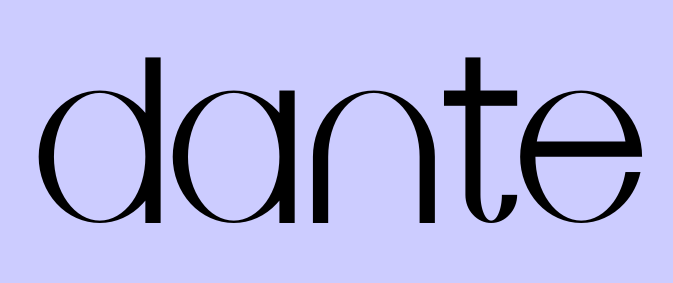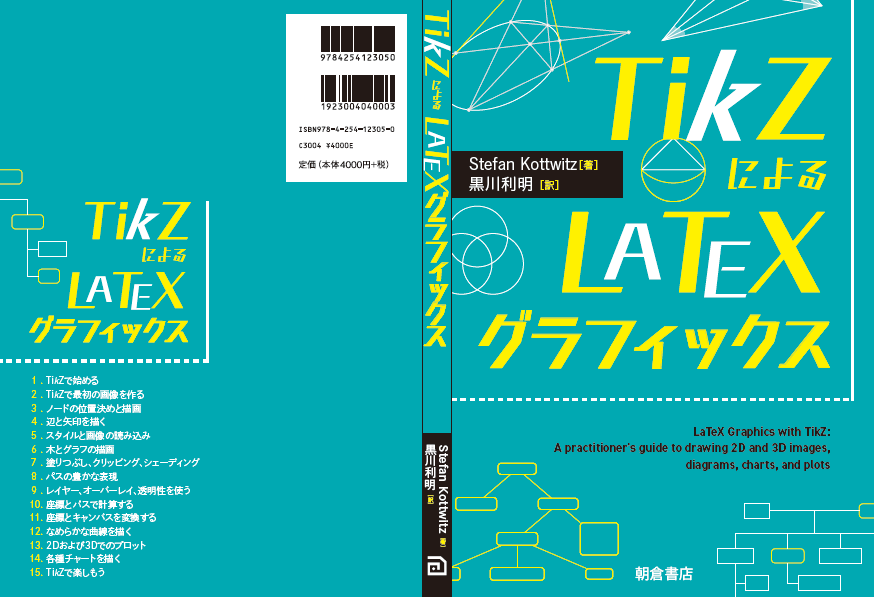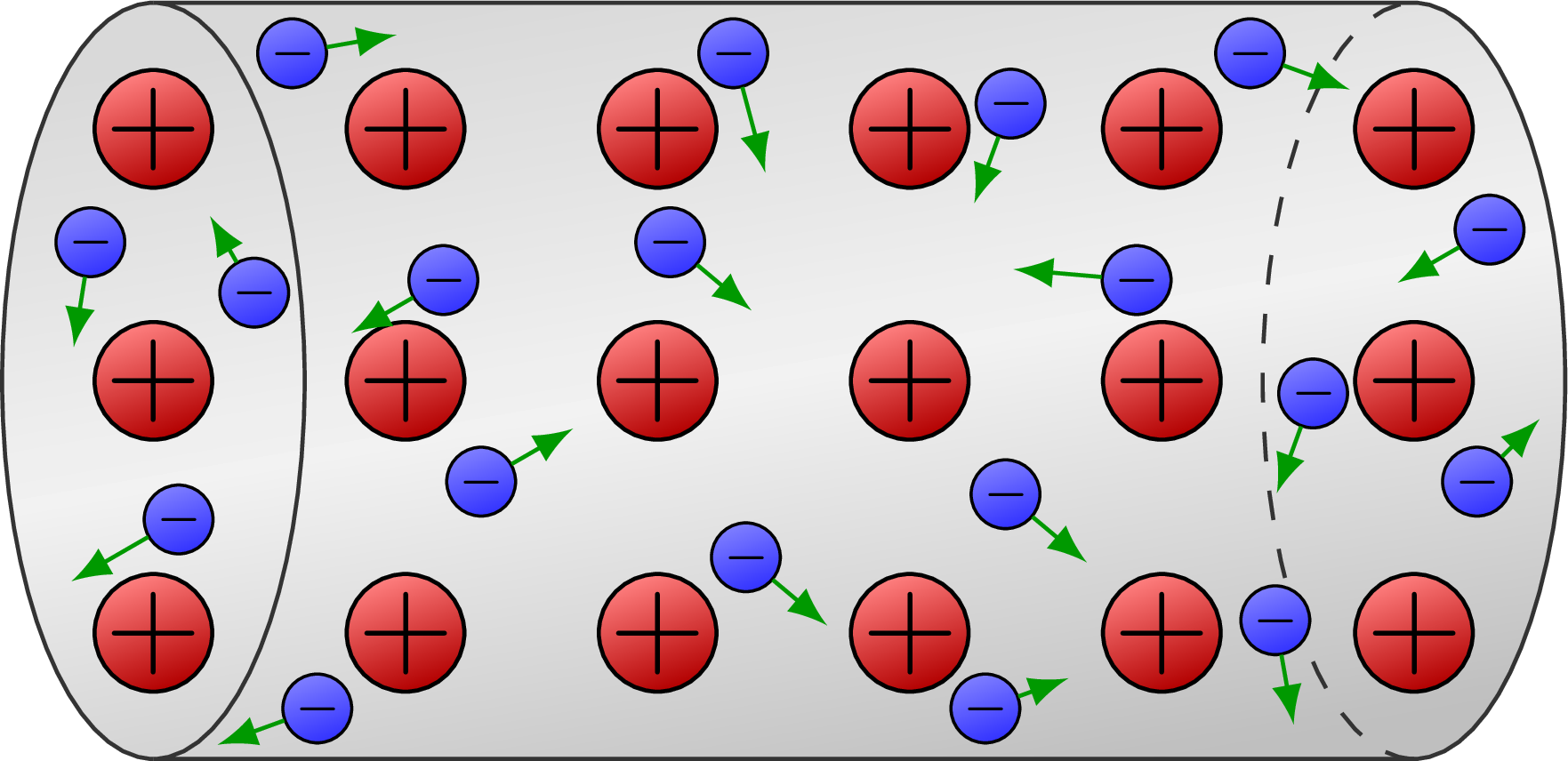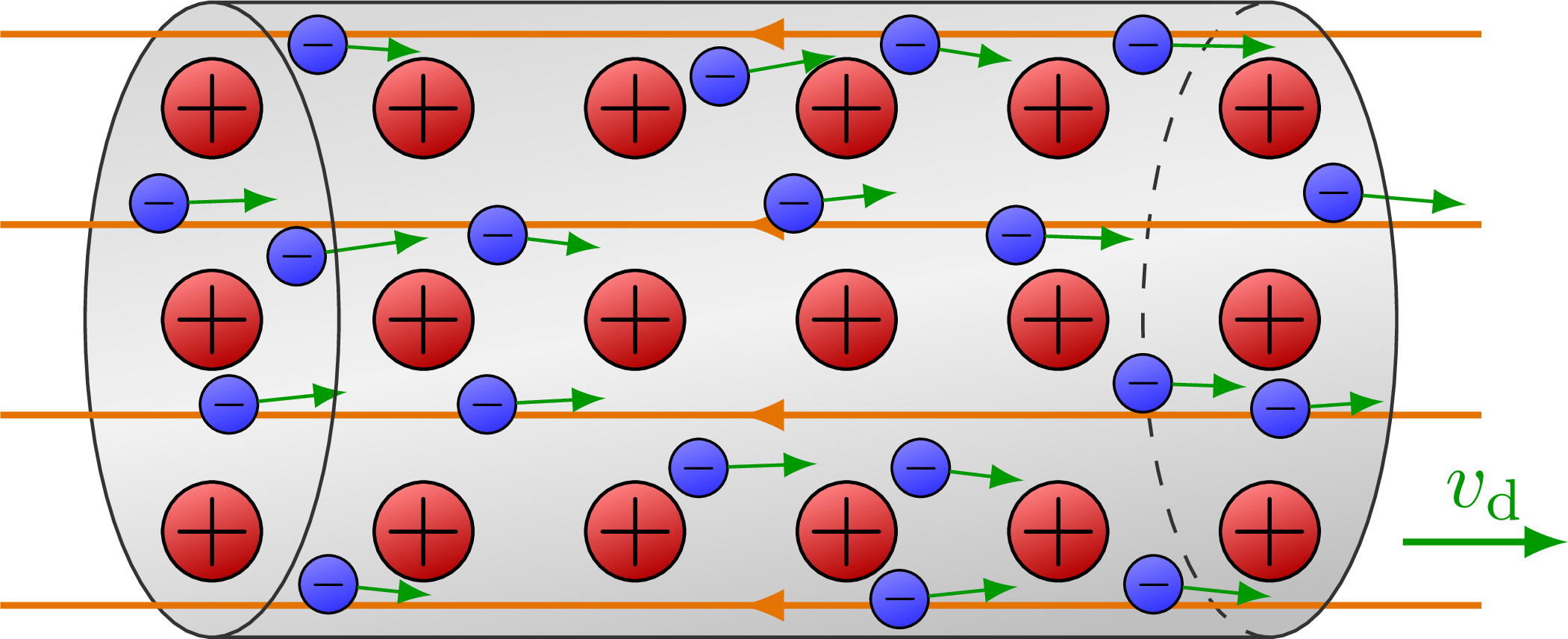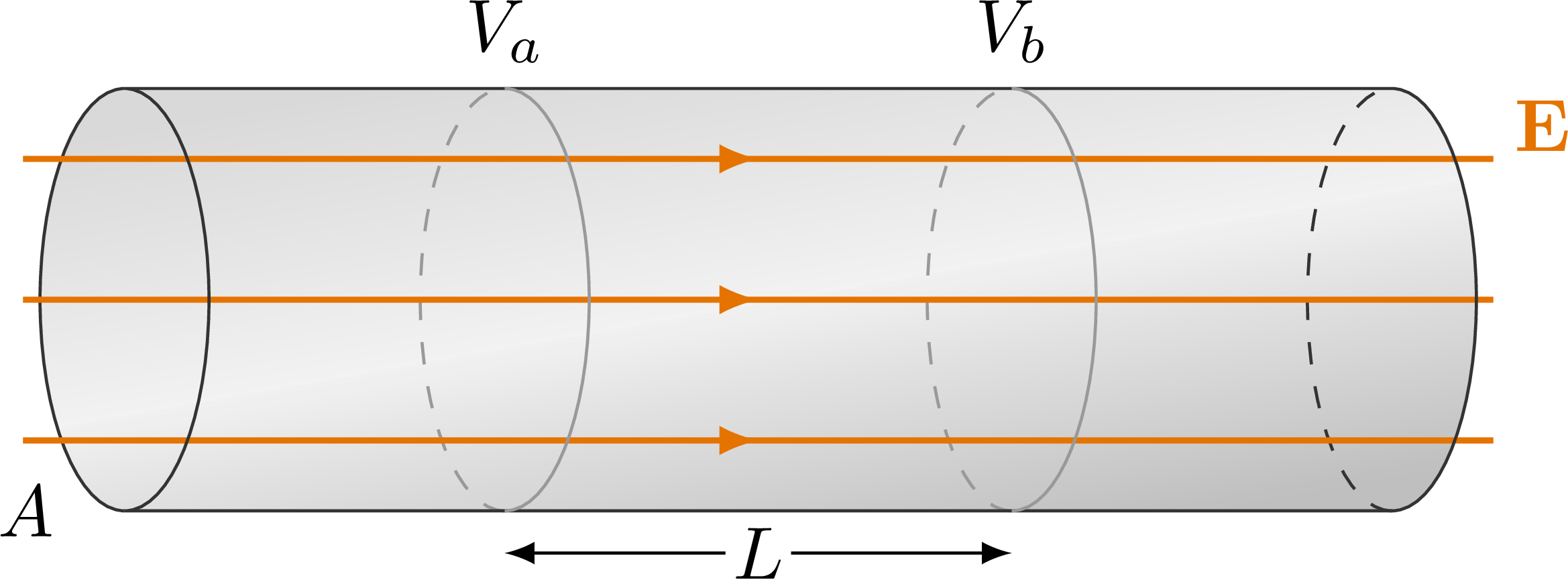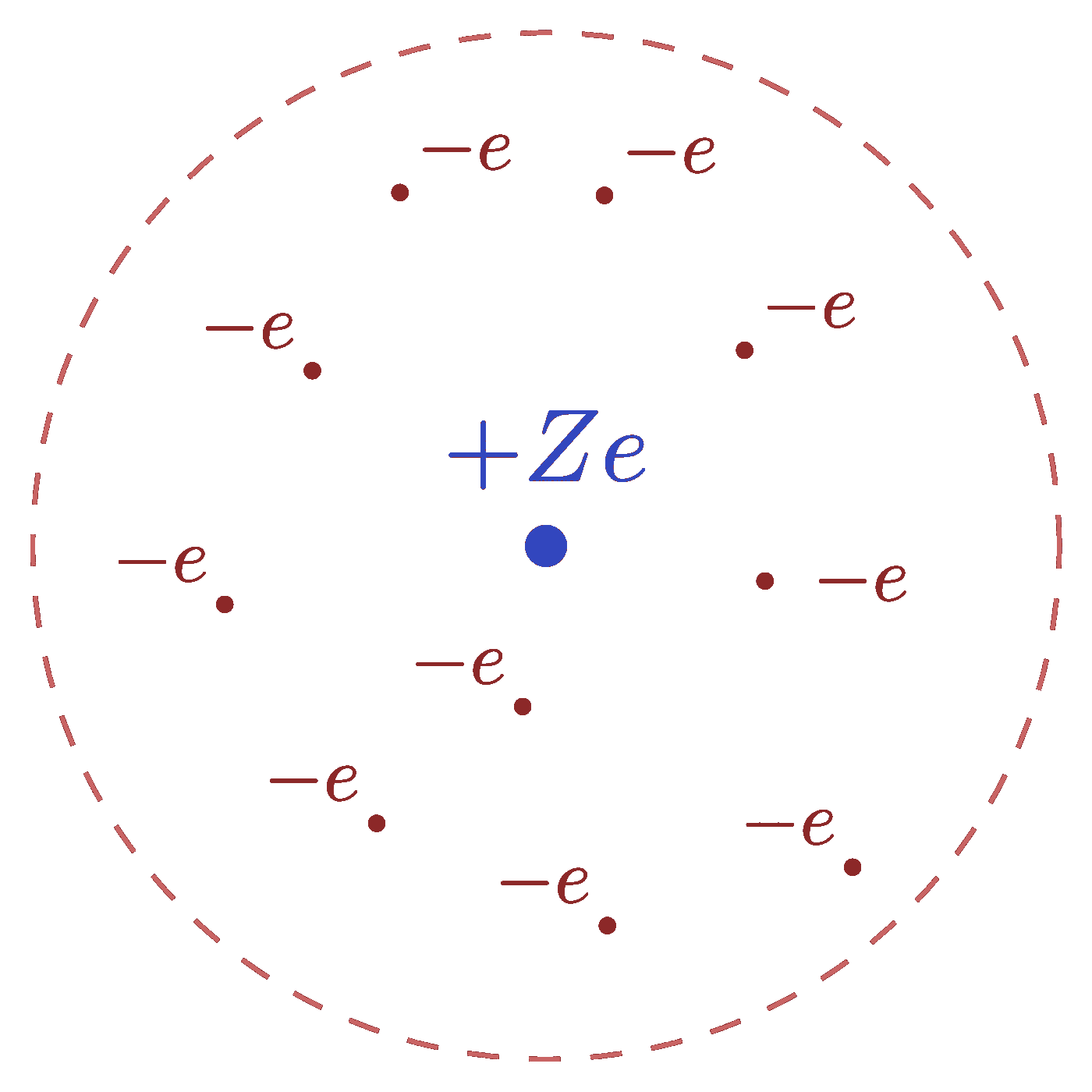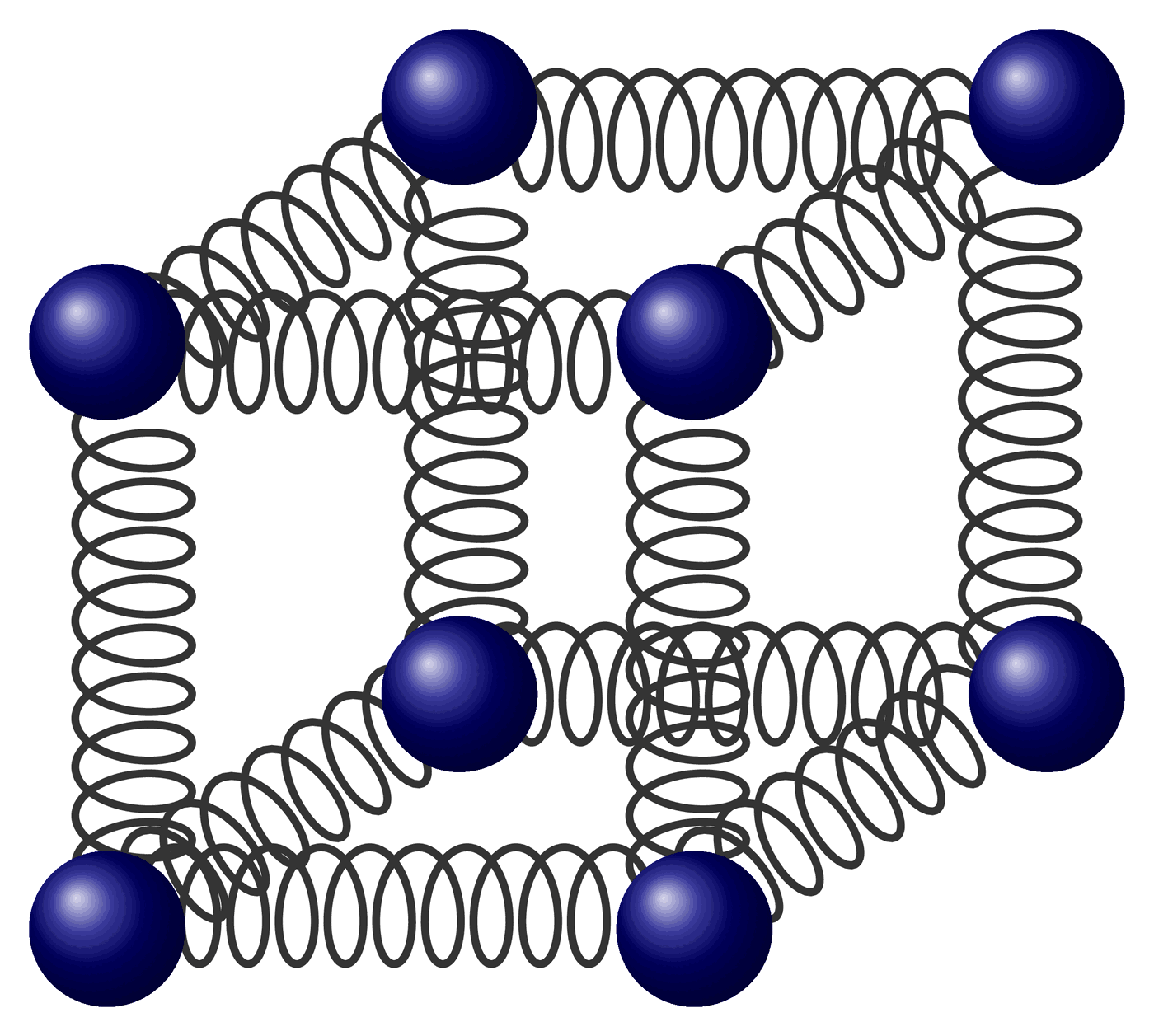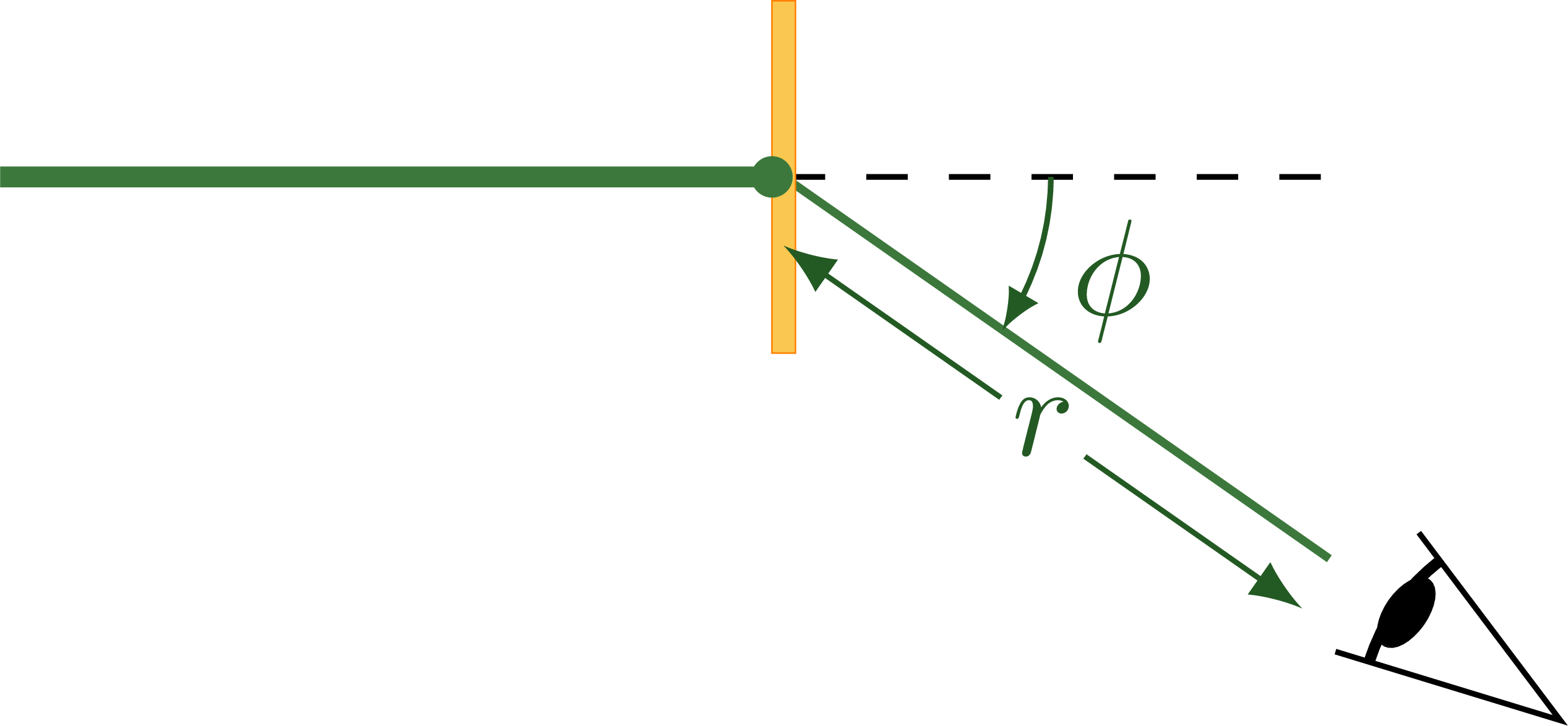Simple model for electric current in metals.
Also have a look at the Thompson and Rutherford model of the atom, and the Bohr model of the atom.
Edit and compile if you like:
% Author: Izaak Neutelings (July 2018)
\documentclass[border=3pt,tikz]{standalone}
\usepackage{amsmath}
\usepackage{physics}
\usepackage{bm}
\usepackage{tikz}
\tikzset{>=latex} % for LaTeX arrow head
\usetikzlibrary{decorations.markings}
\usepackage{xcolor}
\colorlet{Ecol}{orange!90!black}
%\colorlet{charge+}{blue!80!white}
\tikzstyle{charge0}=[top color=green!80!black!50,bottom color=green!80!black,shading angle=20]
\tikzstyle{charge+}=[top color=red!50,bottom color=red!70!black,shading angle=20]
\tikzstyle{charge-}=[top color=blue!50,bottom color=blue!80,shading angle=20]
\tikzstyle{metal}=[top color=black!15,bottom color=black!25,middle color=black!5,shading angle=10]
\tikzset{
EField/.style={thick,Ecol,decoration={markings,
mark=at position #1 with {\arrow{latex}}},
postaction={decorate}},
EField/.default=0.5}
\begin{document}
% CONDUCTION MODEL
\def\R{0.21} % ion radius
\def\a{0.90} % scale
\def\Rx{0.2*\a*\Ny}
\def\Ry{0.5*\a*\Ny}
\def\Nx{6} % number of ions columns
\def\Ny{3} % number of ions rows
\def\L{\a*(\Nx-1)} % length
\def\electron#1#2#3{
\node[charge-,draw=black,circle,fill,inner sep=0.8,scale=0.5,line width=0.3]
(e) at (#1*\a,#2*\a) {$\bm-$};
\draw[->,green!60!black] (e) --++ (#3*0.7*\a);
}
\begin{tikzpicture}
\fill[metal] (0,{-\Ry}) arc (270:90:{\Rx} and {\Ry}) --++ ({\L},0) arc (90:-90:{\Rx} and {\Ry});
\draw[black!80] (0,{-\Ry}) arc (270:90:{\Rx} and {\Ry});
\draw[black!80,dashed] ({\L},{-\Ry}) arc (270:90:{\Rx} and {\Ry});
% IONS
\foreach \j [evaluate={\y=\a*(\j-\Ny/2-0.5);}] in {1,...,\Ny}{
\foreach \i in {1,...,\Nx}{ %[evaluate={\x=\j*\a;}]
\draw[charge+] ({(\i-1)*\a},\y) circle (\R) node[scale=1.4*\a,inner sep=1] {$+$};
}
}
%%%%%%%%%%%%%%%%%%%%%%%%%%%%%%%%% 0
\electron{-0.25}{ 0.55}{ -99:0.6}
%%%%%%%%%%%%%%%%%%%%%%%%%%%%%%%%% 1
\electron{ 0.10}{-0.55}{ 210:0.7}
\electron{ 0.40}{ 0.35}{ 120:0.5}
\electron{ 0.55}{ 1.30}{ 10:0.6}
%%%%%%%%%%%%%%%%%%%%%%%%%%%%%%%%% 2
\electron{ 0.65}{-1.30}{-160:0.6}
\electron{ 1.30}{-0.40}{ 30:0.6}
\electron{ 1.15}{ 0.40}{ 210:0.6}
%%%%%%%%%%%%%%%%%%%%%%%%%%%%%%%%% 3
\electron{ 2.35}{-0.70}{ -40:0.6}
\electron{ 2.05}{ 0.55}{ -40:0.6}
\electron{ 2.30}{ 1.30}{ -75:0.7}
%%%%%%%%%%%%%%%%%%%%%%%%%%%%%%%%% 4
\electron{ 3.30}{-1.30}{ 20:0.5}
\electron{ 3.40}{ 1.10}{-110:0.6}
%%%%%%%%%%%%%%%%%%%%%%%%%%%%%%%%% 5
\electron{ 3.38}{-0.45}{ -40:0.6}
\electron{ 3.90}{ 0.40}{ 175:0.7}
\electron{ 4.35}{ 1.30}{ -20:0.6}
%%%%%%%%%%%%%%%%%%%%%%%%%%%%%%%%% 6
\electron{ 4.45}{-0.95}{ -80:0.6}
\electron{ 5.25}{-0.40}{ 45:0.5}
\electron{ 4.60}{-0.05}{-110:0.6}
\electron{ 5.30}{ 0.60}{-150:0.6}
%%%%%%%%%%%%%%%%%%%%%%%%%%%%%%%%%
\draw[black!80] (0,{-\Ry}) arc (-90:90:{\Rx} and {\Ry}) --++ ({\L},0) arc (90:-90:{\Rx} and {\Ry}) -- cycle;
\end{tikzpicture}
% CONDUCTION MODEL
\begin{tikzpicture}
\fill[metal] (0,{-\Ry}) arc (270:90:{\Rx} and {\Ry}) --++ ({\L},0) arc (90:-90:{\Rx} and {\Ry});
\draw[black!80] (0,{-\Ry}) arc (270:90:{\Rx} and {\Ry});
\draw[black!80,dashed] ({\L},{-\Ry}) arc (270:90:{\Rx} and {\Ry});
% IONS
\foreach \j [evaluate={\y=\a*(\j-\Ny/2-0.5);}] in {1,...,\Ny}{
\foreach \i in {1,...,\Nx}{ %[evaluate={\x=\j*\a;}]
\draw[charge+] ({(\i-1)*\a},\y) circle (\R) node[scale=1.4*\a,inner sep=1] {$+$};
}
}
% ELECTRIC FIELD
\foreach \j [evaluate={\y=0.9*\a*(\j-\Ny/2);}] in {0,...,\Ny}{
\draw[EField] ({\L+\a},\y) -- (-\a,\y);
}
%%%%%%%%%%%%%%%%%%%%%%%%%%%%%%%%% 0
\electron{-0.25}{ 0.55}{ 2:0.8}
%%%%%%%%%%%%%%%%%%%%%%%%%%%%%%%%% 1
\electron{ 0.08}{-0.40}{ 6:0.8}
\electron{ 0.40}{ 0.30}{ 8:0.9}
\electron{ 0.50}{ 1.30}{ -4:0.7}
%%%%%%%%%%%%%%%%%%%%%%%%%%%%%%%%% 2
\electron{ 0.55}{-1.25}{ -6:0.7}
\electron{ 1.30}{-0.40}{ 3:0.8}
\electron{ 1.35}{ 0.40}{ -7:0.7}
%%%%%%%%%%%%%%%%%%%%%%%%%%%%%%%%% 3
\electron{ 2.30}{-0.70}{ 2:0.8}
\electron{ 2.75}{ 0.55}{ 6:0.7}
\electron{ 2.40}{ 1.15}{ 10:0.8}
%%%%%%%%%%%%%%%%%%%%%%%%%%%%%%%%% 4
\electron{ 3.25}{-1.32}{ 6:0.8}
\electron{ 3.30}{ 1.30}{ -9:0.7}
%%%%%%%%%%%%%%%%%%%%%%%%%%%%%%%%% 5
\electron{ 3.35}{-0.70}{ -7:0.7}
\electron{ 3.80}{ 0.40}{ -2:0.8}
\electron{ 4.40}{ 1.30}{ -1:0.9}
%%%%%%%%%%%%%%%%%%%%%%%%%%%%%%%%% 6
\electron{ 4.45}{-1.25}{ -6:0.8}
\electron{ 5.05}{-0.42}{ 4:0.7}
\electron{ 4.40}{-0.30}{ -2:0.7}
\electron{ 5.30}{ 0.60}{ -5:0.9}
%%%%%%%%%%%%%%%%%%%%%%%%%%%%%%%%%
\draw[->,thick,green!60!black] ({\L+1.05*\Rx},-0.7*\Ry) --++ (0.7,0) node[pos=0.5,above=-1] {$v_\mathrm{d}$};
\draw[black!80] (0,{-\Ry}) arc (-90:90:{\Rx} and {\Ry}) --++ ({\L},0) arc (90:-90:{\Rx} and {\Ry}) -- cycle;
\end{tikzpicture}
% CONDUCTION MODEL
\begin{tikzpicture}
\def\NE{3}
\def\L{6}
\def\a{0.3*\L}
\def\b{0.7*\L}
\def\Rx{0.4}
\def\Ry{1.0}
\fill[metal] (0,-\Ry) arc (270:90:{\Rx} and {\Ry}) --++ ({\L},0) arc (90:-90:{\Rx} and {\Ry});
\draw[black!80] (0,-\Ry) arc (270:90:{\Rx} and {\Ry});
\draw[black!80,dashed] (\L,-\Ry) arc (270:90:{\Rx} and {\Ry});
\draw[black!40,dashed] (\a,-\Ry) arc (270:90:{\Rx} and {\Ry});
\draw[black!40,dashed] (\b,-\Ry) arc (270:90:{\Rx} and {\Ry});
% ELECTRIC FIELD
\foreach \j [evaluate={\y=-\Ry+(\j-0.5)*2*\Ry/\NE;}] in {1,...,\NE}{
\draw[EField] (-1.2*\Rx,\y) -- (\L+1.2*\Rx,\y);
}
\draw[black!80] (0,-\Ry) arc (-90:90:{\Rx} and {\Ry}) --++ (\L,0) arc (90:-90:{\Rx} and {\Ry}) -- cycle;
\draw[black!40] (\a,-\Ry) arc (-90:90:{\Rx} and {\Ry});
\draw[black!40] (\b,-\Ry) arc (-90:90:{\Rx} and {\Ry});
\draw[<->] (\a,-1.2*\Ry) -- (\b,-1.2*\Ry) node[midway,fill=white,inner sep=1] {$L$};
\node[above] at (\a,\Ry) {$V_a$};
\node[above] at (\b,\Ry) {$V_b$};
\node[left=6] at (0,-\Ry) {$A$};
\node[below=5,right=13,Ecol] at (\L,\Ry) {$\vb{E}$};
\end{tikzpicture}
\end{document}Click to download: electric_current.tex • electric_current.pdf
Open in Overleaf: electric_current.tex
